By James Tabafunda
NORTHWEST ASIAN WEEKLY
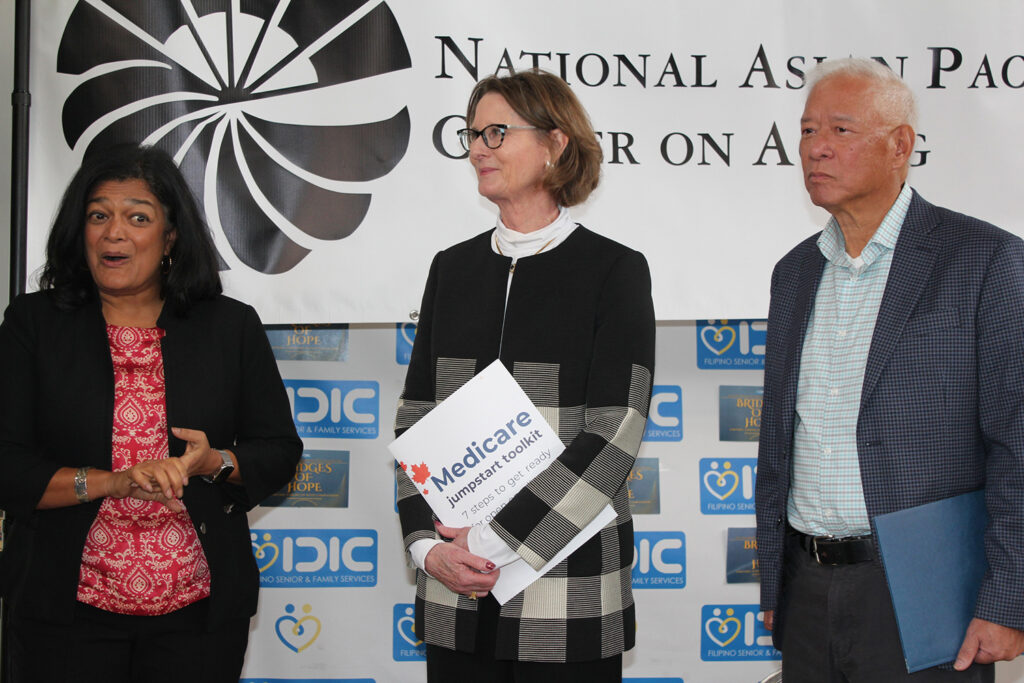
(From left to right): Rep. Pramila Jayapal, Insurance Commissioner Patty Kuderer, NAPCA President and CEO Clayton Fong (Photo by James Tabafunda)
Seattle’s Beacon Hill became a hub for urgent public health outreach this month as the National Asian Pacific Center on Aging (NAPCA) and IDIC Filipino Senior and Family Services, in partnership with Kroger Health, hosted their third-annual Open Enrollment and Vaccination event, targeting the needs of Filipino seniors and families.
The clinic, held on Oct. 3, marks a new era in Seattle’s 2025 senior outreach efforts, combining critical immunizations with multilingual health navigation, social services, and direct access to benefit programs for the city’s most vulnerable residents.
Public health opportunity for seniors and families
The day-long health fair provided free vaccines against influenza, COVID-19, respiratory syncytial virus (RSV), pneumonia, and shingles, paired with hands-on support for Medicare open enrollment, Medicaid enrollment, housing aid, meal programs, and prescription assistance. In-language public health navigation and policy support were available through the Washington Office of the Insurance Commissioner, aiming to help Asian American and Pacific Islander (AAPI) elders keep up-to-date with rapid changes in pandemic impacts, vaccine standards, and benefit requirements such as SNAP (Supplemental Nutrition Assistance Program) for food access.
Walk-ins were welcomed, while preregistration helped guarantee vaccine availability. Attendees were urged to bring their photo ID, health insurance, and/or Medicare cards.
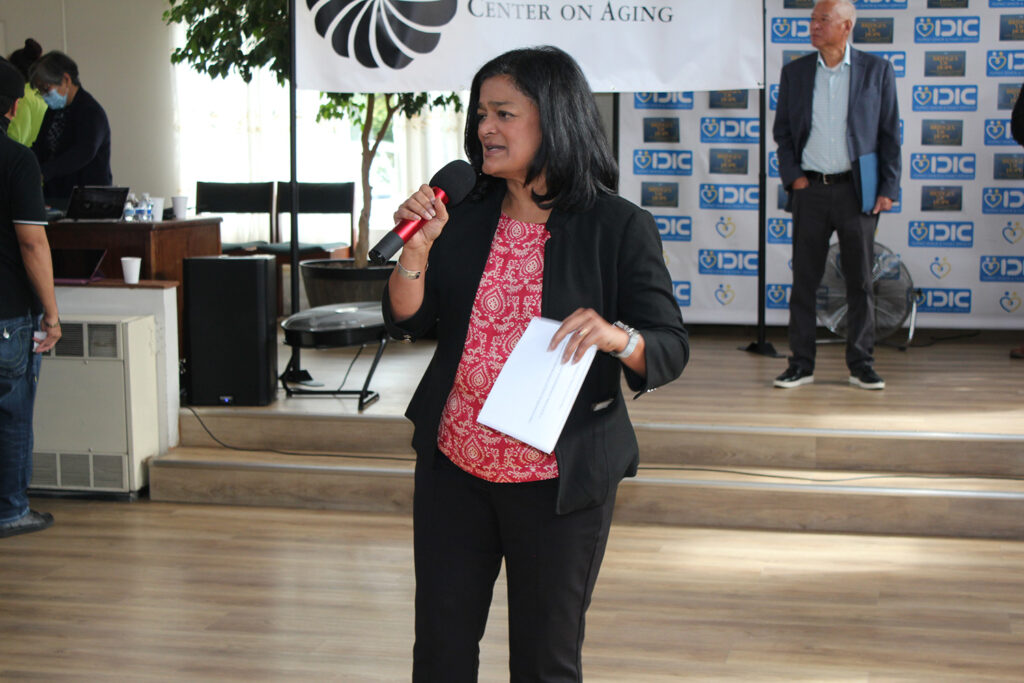
Rep. Pramila Jayapal, D-Wash., speaks at the Open Enrollment and Vaccination event on Oct. 3 at IDIC Filipino Senior and Family Services. (Photo by James Tabafunda)
Rep. Pramila Jayapal and Insurance Commissioner Patty Kuderer addressed the crowd at the event. Jayapal pointed out the rising demand for vaccines amid growing confusion over health communications and changing public benefits.
“What is happening today with the vaccines is so important because there’s so much misinformation out there about vaccines right now.”
Jayapal added, “I know it’s confusing, but you all being here and getting your vaccinations … we are so grateful because we have to keep ourselves healthy.” She pledged to continue fighting for language access, affordable prescription drugs, and reliable health coverage.
“This is the work that we have to do right now to save our health care, to reopen the government so that people can get their food stamps, their WIC (Women, Infants, and Children) subsidies, all of the things that keep us healthy. You deserve to be healthy.”
Kuderer echoed the importance of local partnerships and multilingual outreach.
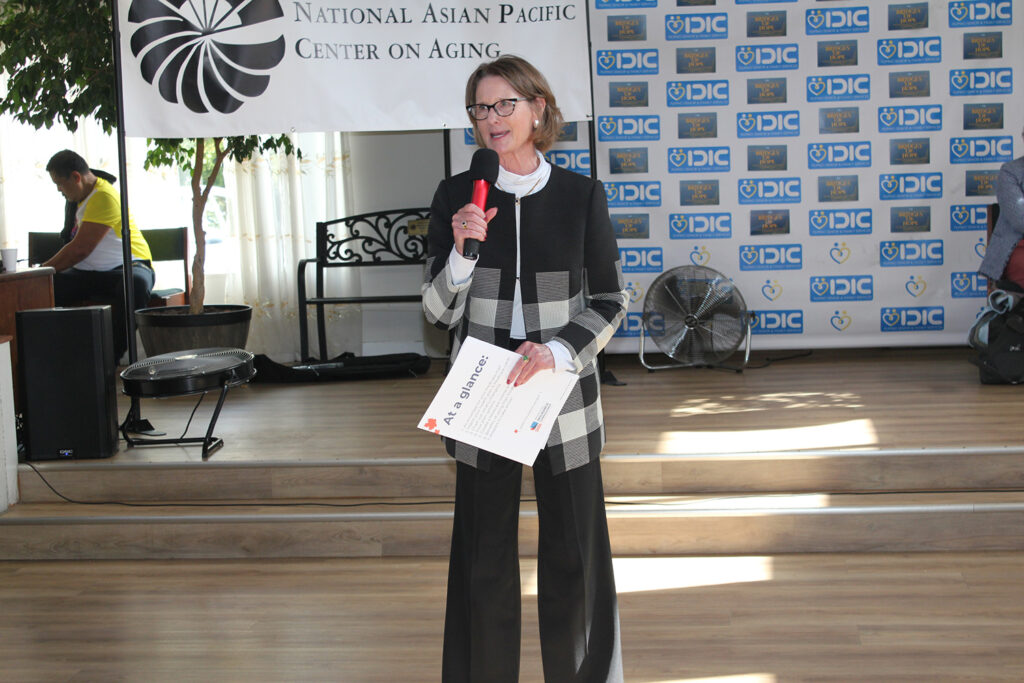
Insurance Commissioner Patty Kuderer speaks at the Open Enrollment and Vaccination event on Oct. 3 at IDIC Filipino Senior and Family Services. (Photo by James Tabafunda)
“When I was going around the state talking to people about this job, I heard a lot about health care,” she said, citing widespread confusion over Medicare and Medicare Advantage plans.
She introduced her office’s new Medicare Jumpstart Toolkit—“the first in the nation”—created in 14 languages and designed to help seniors take the first steps to organize and understand their coverage ahead of open enrollment.
“If you need help with Medicare, please give us a call. If you know someone who needs help with Medicare, ask them to give us a call because we want to have your phone calls,” Kuderer urged attendees. She also warned about a new federal pilot program testing prior authorization for traditional Medicare: “We will be monitoring that, and we will hear from you if you have concerns.”
Community-rooted trust
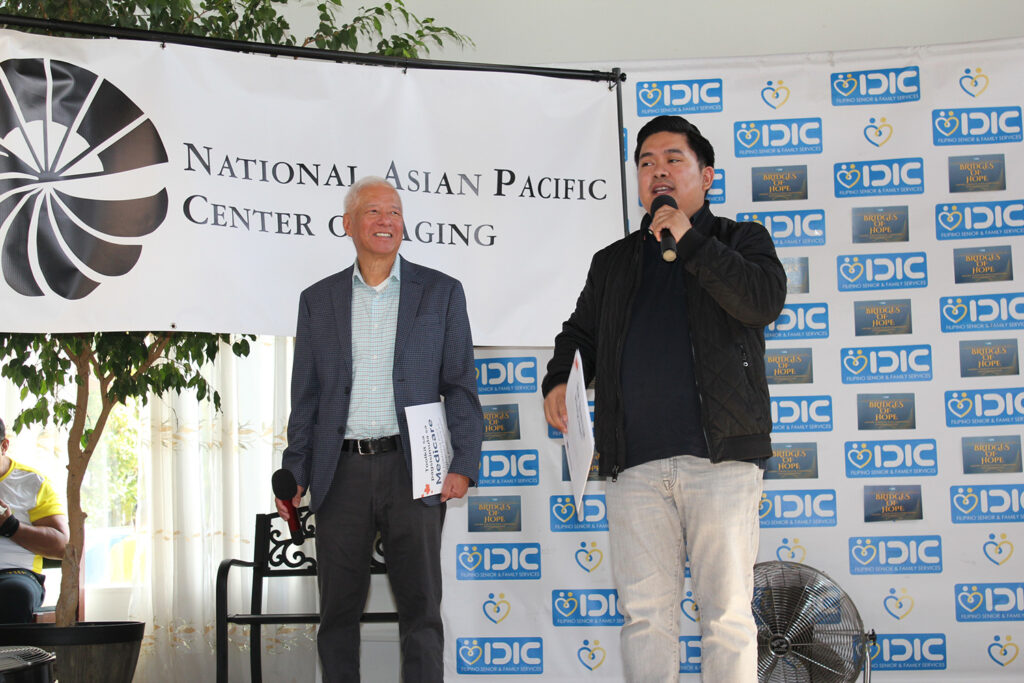
(From left to right): NAPCA President and CEO Clayton Fong, IDIC Executive Director Lanvin Andres. (Photo by James Tabafunda)
Initiatives like these, organizers say, serve as a blueprint for closing equity gaps in senior health. “A community-based model works,” said Lanvin Andres, executive director of IDIC. “By combining vaccines, benefit navigation, social connection, and culturally grounded trust, we offer a blueprint for equitable care. Without targeted, in-language outreach, Limited English Proficiency seniors risk missing lifesaving care or critical benefits.”
Staff and volunteers assisted attendees in Tagalog, Ilocano, and English, often signing up seniors and families for Medicaid, Medicare, and meal programs, and explaining vaccine safety and post-visit instructions in accessible language.
Attendance exceeded pre-pandemic levels, with many first-time visitors joining at the urging of family members who had benefited from IDIC’s growing social media presence. Andres cautioned, “Healthcare remains complicated to navigate for many. Number one, language is very important. Though Filipinos know basic English, healthcare language is not always understandable to the Filipino elderly.” He said the gap persists.
To address the issue, IDIC’s ACAP (Assisting Care to the Aging Population) employs medical professionals who speak the language and help seniors interpret medical advice and paperwork.
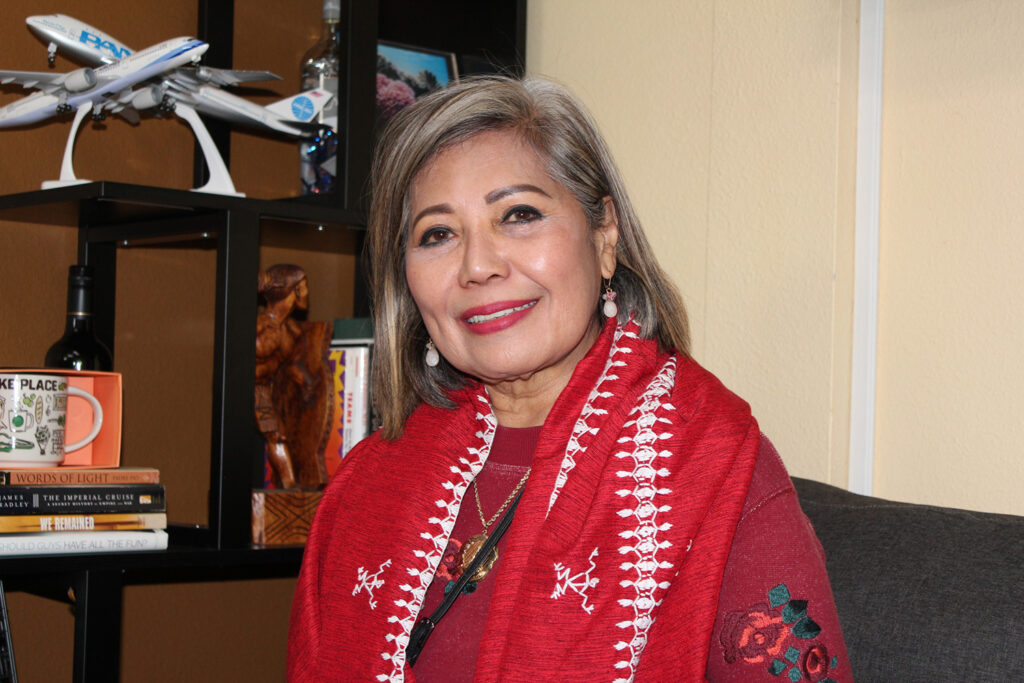
IDIC Board President Mariela Fletcher (Photo by James Tabafunda)
IDIC Board President Mariela Fletcher explained, “The way we are set up, our seniors are truly just trusting. This is where they get social services—and that’s where confidence in the relationship happens.”
Vaccine access, equity, and hesitancy
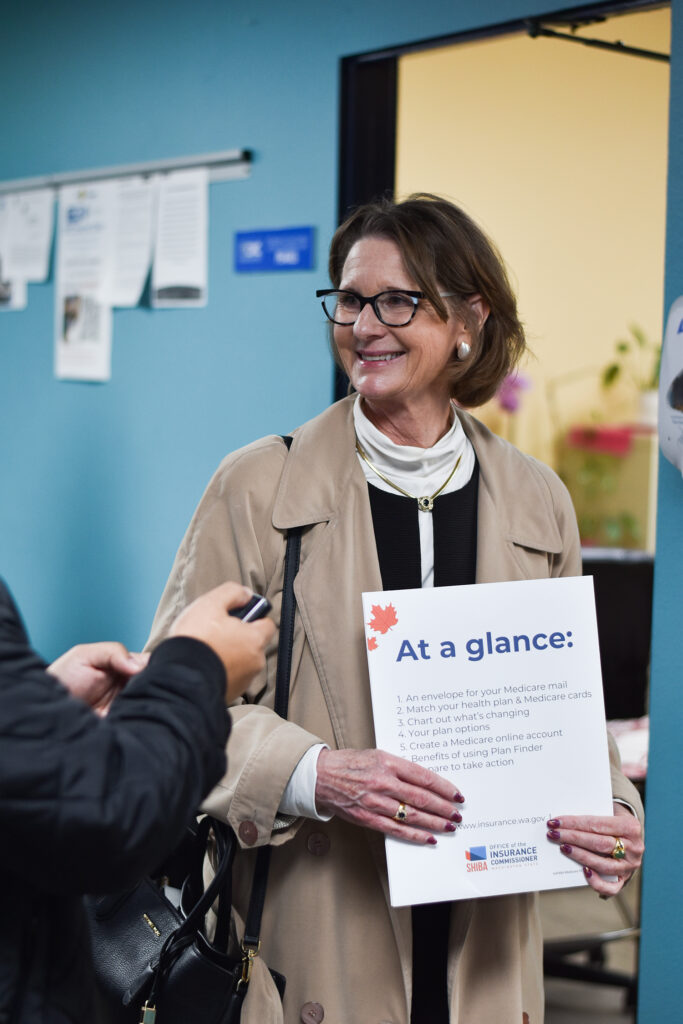
Insurance Commissioner Patty Kuderer at the Open Enrollment and Vaccination event on Oct. 3 at IDIC Filipino Senior and Family Services. (Photo by Emma Lu)
National and county data show persistent barriers to immunization, especially among immigrants and those with limited English proficiency. The Washington State Department of Health forecasts a moderate to high flu season, with continued circulation of COVID-19, RSV, and the appearance of pneumonia and shingles in 2025. CDC guidance recommends updated COVID-19 boosters for all adults, and RSV vaccination for seniors aged 60 and up or those with chronic health conditions. Nevertheless, in King County, recent data sets COVID-19 vaccination coverage at about 54%, notably lower for immigrant and non-English-speaking seniors.
Vaccine hesitancy, misinformation, and digital divides remain as problems.
“Our population, and most especially the seniors, are not tech-savvy,” Fletcher said. “They rely on what they hear. Translation is very important.” Partnerships with Kroger Health and state agencies ensured free, science-based vaccine information, while volunteer interpreters and medical professionals cut through clinic confusion for those less comfortable with online registration or health portals.
Clayton Fong, president and CEO of NAPCA, discussed the spirit and impact of the event.
“The best thing about this event is how much fun the elders have. You can see they’re out there line dancing, doing Zumba … this is the biggest, most fun one.” Fong also brought up the urgency for all generations to get vaccinated: “If not for you, for your mom, your dad, or your grandparents. Protect your community, and remember there’s a helpline to help with your healthcare questions.”
Historic roots and multigenerational resilience
Founded in 1979, NAPCA provides national advocacy, outreach, and resources for AAPI older adults, answering more than 250,000 multilingual calls since inception and delivering programs in employment training, digital literacy, health navigation, and benefits enrollment.
IDIC Filipino Senior and Family Services, begun in 1971, serves as a full-service hub for seniors and their families, providing hundreds of weekly meals, mental health counseling, fitness classes, and social support. Attendance and engagement have tripled since pre-pandemic years, with the center routinely assisting clients with complex health and benefit applications.
Andres said, “CBOs (Community Based Organizations) like us are where the community relies on for accurate information about their health … and they rely on us in every single thing that they go through when it comes to their health.”
He also explained what happens in families: “When you have well-informed elderly, it funnels down to the whole family. In Filipino culture, elders are respected authority figures, and accurate information from them influences everyone else.” Younger Filipino American family members often bridge cultural and language divides, helping their elders access trusted care and navigate benefit enrollment.
Closing gaps—a blueprint for community health
The open enrollment and vaccination event on Beacon Hill is more than a one-day clinic. It is part of a broader movement towards community-based care that pairs medical resources with culturally sensitive communication and support.
“Collaboration with the agency and media, this is how we should continue the work,” Fletcher said.
County and state health experts underscore the benefits of combining vaccines, benefits counseling, and social connection. Recent King County health assessments show life expectancy for Native Hawaiian and Pacific Islander residents is still well below the regional average, and overall immunization rates for immigrant and minority communities are disproportionately low. Events like this aim to reverse those trends by supporting seniors where they are, in familiar settings with trusted providers.
Looking forward
Organizers see this year’s event as a blueprint for other communities seeking to close health equity gaps. “Trust built through culturally sensitive communication and institutional partnership is key to overcoming vaccine hesitancy and increasing acceptance among families,” said Andres.
For more information on the National Asian Pacific Center on Aging, go to www.napca.org. For more information on IDIC Filipino Senior and Family Services, go to www.idicseniorcenter.org.
